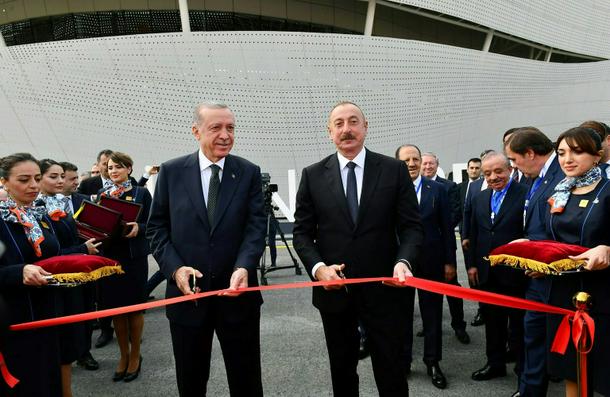
Erdogan attended the inauguration of a new airport in Zangilan, which Baku's forces recaptured from Armenian separatists during their 2020 conflict
Zangilan (Azerbaijan) (AFP) - Turkish President Recep Tayyip Erdogan said on Thursday that there was an opportunity to repair ties with arch-foe Armenia, linking it with the normalisation underway between Yerevan and Ankara’s ally Azerbaijan.
Earlier this month, Yerevan and Baku began drafting the text of a future peace treaty, with Erdogan subsequently meeting Armenian Prime Minister Nikol Pashinyan for rare talks in the Czech Republic.
“The processes of normalisation between Azerbaijan and Armenia, between Turkey and Armenia, are interdependent,” Erdogan said on a visit to Azerbaijan’s Zangilan district.
“We must seize the opportunity which has opened,” he told a news conference alongside Azerbaijani President Ilham Aliyev.
Erdogan attended the inauguration of a new airport in Zangilan, which Baku’s forces recaptured from Armenian separatists during their 2020 conflict.
Aliyev said “the unity of Azerbaijan and Turkey sends a serious message to the region and the entire world as it is a factor of stability”.
Turkey and Armenia have been at loggerheads for decades over Yerevan’s insistence that the World War I-era mass killings of Armenians in the Ottoman empire be recognised as genocide.
Turkey fiercely rejects the label.
The two countries have no diplomatic relations and their ties were further damaged by Turkey’s support of Turkic-speaking Azerbaijan during Baku’s 2020 military conflict with Armenia.
Baku and Yerevan fought two wars – in 2020 and in the 1990s – over Azerbaijan’s Armenian-populated region of Nagorno-Karabakh.
Following diplomatic efforts from Brussels and Washington, Armenian and Azerbaijani foreign ministers met on October 3 in Geneva to begin drafting the text of a future peace treaty.
When the Soviet Union collapsed in 1991, ethnic Armenian separatists in Nagorno-Karabakh broke away from Azerbaijan. The ensuing conflict claimed around 30,000 lives.